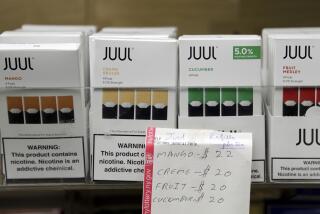Tobacco Suit Study Backs U.S.
- Share via
The federal government is entitled to a major share of any of the bounty that states have recovered in lawsuits against the tobacco industry for Medicaid expenses for sick smokers, according to a study released Friday by a Washington public-interest organization.
The Center on Budget and Policy Priorities also said that the federal government would be entitled to a large chunk of the money if Congress enacts legislation embodying the proposed $368.5-billion national tobacco settlement. The states would get $190 billion of those funds under terms of the settlement announced on June 20.
Federal officials maintain that they are entitled to more than half the $190 billion, and the issue has become increasingly contentious in recent months. A congressional subcommittee will take up the issue at a hearing Monday.
Among those scheduled to testify are Nancy-Ann Min DeParle, administrator of the federal Health Care Financing Administration (HCFA), and two of her primary adversaries on the issue--Florida Gov. Lawton Chiles and Mississippi Atty. Gen. Mike Moore.
Phil Schiliro, key aide to Rep. Henry Waxman (D-Los Angeles) on tobacco matters, said he thought the study would have a significant impact because the center’s work is well-respected.
The study notes that, on average, the federal government contributes 57% of the Medicaid program’s costs, with the remaining 43% paid by the states.
In November, HCFA officials sent a letter to state Medicaid directors saying that states that recover from the tobacco industry are expected to compensate HCFA just as they would on other Medicaid-related recoveries.
That letter drew a sharp retort from 40 state attorneys general, including Moore, who have sued the industry seeking recovery for Medicaid payments, as well as damages and penalties for violations of state antitrust and consumer protection laws. Their written retort noted that the federal government had declined to sue the industry.
“It is the intention of the states that their damage payments be used within each state primarily for public-health purposes,” the letter stated. “The citizens of our states are entitled to the benefit of the litigation we have prosecuted on their behalf and any settlement entered into to resolve their lawsuits.”
The center sharply takes issue with the stance of the attorneys general--and the identical position of the National Governors Assn.--that the federal government is not entitled to the money.
“The state position is incorrect,” said Andy Schneider and Sara Thom of the center. “Under long-standing law and practice, the federal government is clearly entitled to a share of those settlement payments that are attributable to Medicaid costs.”
The study also criticizes legislation introduced by Sen. Bob Graham (D-Fla.) and Rep. Michael Bilirakis (R-Fla.) that would exempt settlement recoveries from normal Medicaid reimbursement procedures.
In August, Florida settled its litigation against the tobacco industry for $11.3 billion. Chiles staunchly maintains that the state is entitled to keep all that money. Moore takes the same position on the $3.4-billion settlement his state made with the industry in July.
The center contends, however, that if Florida and Mississippi were able to keep all the money as a result of the settlements or superseding federal legislation, it would represent a substantial windfall to the states and impose an increased fiscal burden on the Medicaid program.
Normally, the states are required to reimburse the federal government for Medicaid funds they recover in proportion to the share Uncle Sam has paid. The Medicaid reimbursement law has no exceptions in it, the center study stresses.
It also stresses that if the Bilirakis-Graham legislation were enacted, it would mean that the federal government would still be responsible for financing a significant share of each state’s Medicaid program but would not benefit from a huge Medicaid-linked financial recovery.
More to Read
Sign up for Essential California
The most important California stories and recommendations in your inbox every morning.
You may occasionally receive promotional content from the Los Angeles Times.













